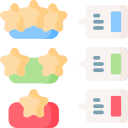Instructors, Mentorship, And Support: The Human Engine Of Learning
We verify instructor experience in production environments, open-source contributions, and teaching track records. A senior engineer who has shipped failures and fixes brings hard-earned judgment. Share your dream instructor profile below—your input shapes how we rank the human element in each comparison.
Instructors, Mentorship, And Support: The Human Engine Of Learning
Some courses offer weekly one-on-one sessions; others rely on group coaching or peer pairing. We measure frequency, structure, and outcomes of mentorship. A reader named Daniel credited steady mentor check-ins for demystifying architecture decisions, so we pay close attention to predictable cadence and accountability.
Instructors, Mentorship, And Support: The Human Engine Of Learning
Support delays can stall learning. We evaluate ticket systems, discussion forums, real-time chat, and instructor office hours for timeliness and quality. If a course consistently answers within a day with actionable guidance, we score it higher. Tell us your response-time expectations so we can weight them fairly.
Instructors, Mentorship, And Support: The Human Engine Of Learning
Lorem ipsum dolor sit amet, consectetur adipiscing elit. Ut elit tellus, luctus nec ullamcorper mattis, pulvinar dapibus leo.



